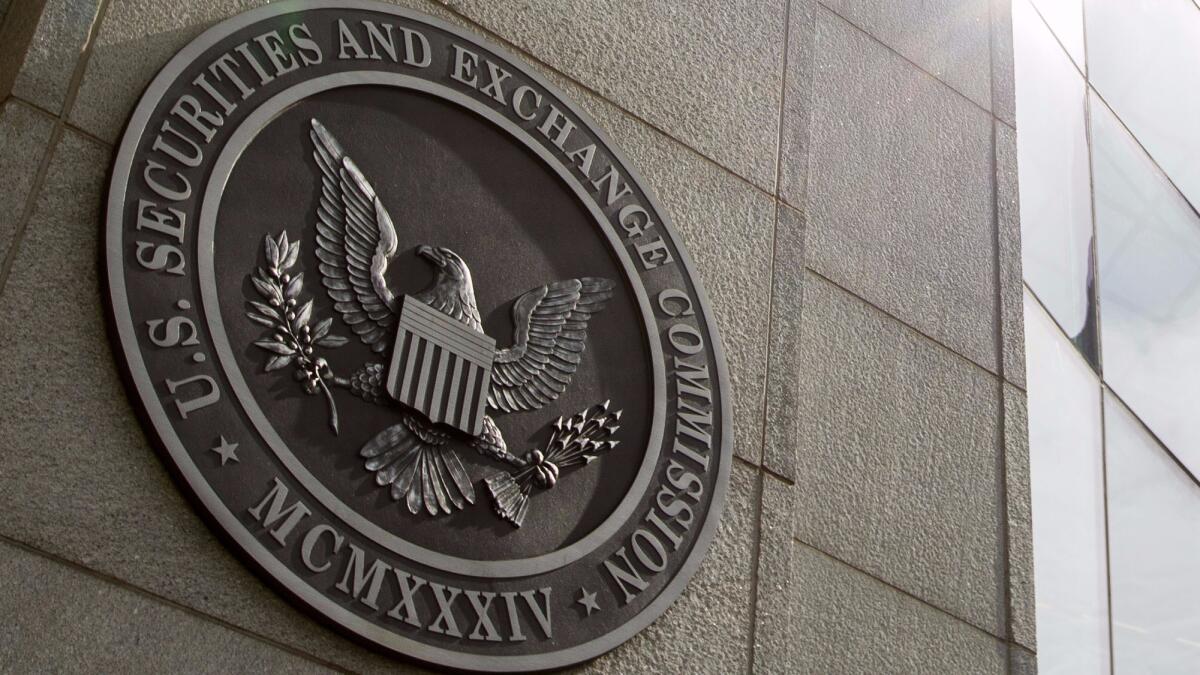A weird fraud case: Lender was accused of making good mortgages look bad

The Securities and Exchange Commission brought the case against First Mortgage Corp., a defunct Ontario mortgage lender.
- Share via
In countless cases against banks and other lenders over the last few years, investors and federal regulators have made basically the same argument: that lenders committed fraud by hiding the flaws of risky mortgage loans and passing them off to investors and the government as safe, solid ones.
But how about a case against a lender that did the opposite, taking good loans and making them look bad?
That’s the twist in the tale of First Mortgage Corp., a defunct Ontario mortgage lender that this week agreed to pay $12.7 million to settle a first-of-its-kind civil fraud case brought by the Securities and Exchange Commission.
See more of our top stories on Facebook >>
The SEC alleged that First Mortgage pulled a switcheroo with the investors that purchased its loans.
First Mortgage told investors that some borrowers had fallen months behind on their loans, when in fact the company had received – but not deposited – payments from those borrowers, according to the suit, filed by the SEC in federal court in Los Angeles this week.
That allowed First Mortgage to repurchase those loans at a discount, deposit the payments and resell the now-squeaky-clean loans at full price to other investors, giving the company “an immediate, nearly risk-free profit,” according to the suit.
The SEC alleged that First Mortgage and its executives did this with hundreds of mortgages between 2011 and 2015, reaping profits of $7.5 million.
SIGN UP for the free California Inc. business newsletter >>
Mark Olthoff, an attorney at law firm Polsinelli, said while the case has elements of garden-variety fraud – withholding information from investors, or lying to them outright – it also turns the typical mortgage manipulation scheme on its head.
“It’s a creative securities fraud,” he said. “It’s ordinarily the other way around — trying to pass off the bad loans as good ones.”
It’s a creative securities fraud. It’s ordinarily the other way around — trying to pass off the bad loans as good ones.
— Mark Olthoff, an attorney at law firm Polsinelli
Indeed, investors and the Justice Department have filed numerous cases alleging that lenders and bond-rating firms sold mortgage-backed bonds that were billed as safe despite being backed by risky loans, or certified that loans met certain standards when they really didn’t.
There has been a steady supply of such cases in the years since the financial crisis, resulting in billions of dollars in settlements, and more cases are still being filed.
In February, Wells Fargo & Co. agreed to pay $1.2 billion to settle allegations that it duped the Federal Housing Administration into insuring thousands of loans that didn’t meet federal requirements. And in April, California Atty. Gen. Kamala Harris sued investment bank Morgan Stanley, saying the firm misrepresented the riskiness of mortgage bonds purchased by California’s pension funds.
Those types of cases could be less common in the future, Olthoff said, as investors and federal officials have grown more wary of the quality of mortgages they invest in or insure. But investors are less likely to be on the lookout for the kind of fraud the SEC says First Mortgage pulled off, potentially giving rise to more such cases.
Of course, Olthoff also noted that investors would likely prefer to be the victims of this new kind of fraud than the old kind. While selling a good loan at a discount amounts to a small loss, keeping a loan that ultimately goes bad amounts to a much bigger one, he said.
“It’s not as if the investors here are losing a lot of money,” he said.
First Mortgage, which had dozens of offices in California and other Western states, specialized in lending to first-time and low-income home buyers. The SEC investigation focused on loans backed by government entity Ginnie Mae, which guarantees loans made through the FHA and other federal programs.
First Mortgage closed its doors last year, with President Clement Ziroli Jr. telling a trade publication that “regulatory pressure” motivated the move.
This week, the company and six executives, including Ziroli and his father, Chief Executive Clement Ziroli Sr., agreed to pay to settle the case, though they did not admit wrongdoing. Of the six, Ziroli Jr. will pay the most, agreeing to shell out about $640,000.
Ziroli Jr. did not respond to a request for comment. Samuel Winer, an attorney for First Mortgage, declined to comment.
MORE FROM BUSINESS
Uber and Lyft team up to deliver for Wal-Mart
Clif Bar recalls three products due to listeria risk
Financial firms lead stocks lower after a weak jobs report
Twitter: @jrkoren
More to Read
Inside the business of entertainment
The Wide Shot brings you news, analysis and insights on everything from streaming wars to production — and what it all means for the future.
You may occasionally receive promotional content from the Los Angeles Times.











